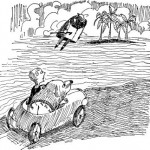The greatest trick the Devil ever pulled was convincing the world to sign up for Facebook
Amid the controversy around Facebook user settings, privacy violations and monetization, The Social Network humanizes Facebook’s founder and, like it or not, Zuckerberg should count this as a win.

Image via CrunchBase
I’m not going to go into much detail about why The Social Network is an excellent movie (and it is) but trust me, you should go see it. In the weeks leading up to the movie’s premiere, it was pretty clear that everyone thought that the film would be a huge PR hit against Zuckerberg, that he would come out looking like a horrible person and that it would be bad for the company. However, if you were expecting something along the lines of Pirates of Silicon Valley’s treatment of Steve Jobs, you’d be very wrong.
Instead, Eisenberg’s portrayal of Zuckerberg felt eminently human. You may not like the movie and you may not like Zuckerberg’s actions as portrayed or in real life. However, Zuckerberg has been plastered in the media as the poster boy for our disappearing privacy on the internet. Of course, this is patently untrue. We choose to put our information online and the moment we do so, we’ve given it up. Google probably deserves more blame, because they make the information so accessible, than Facebook.

Image via CrunchBase
Facebook made the internet cool for the masses and, more than any other site, really broke the barrier for the social web and in our heads, when it comes to sharing information about ourselves. As a result, Zuckerberg often is the scapegoat for our entrance into the panopticon and he doesn’t always deal with it well. Zuckerberg has become a symbol to many for the loss of privacy in the internet age but The Social Network has taken a big step in breaking this down.
Past here are spoilers, so go see the movie, come back and we can continue the discussion.
Zuckerberg’s character in the film feels the loss of privacy himself, before Facebook even begins and in many ways he’s burned by it. However, that’s not the most significant thing in the movie that should help the Facebook founder’s image.
A great line comes at the very end of the film:
“Every creation myth needs a devil.”
The thing is, we’re not talking about the creation myth of Facebook, but of the new age of social networking. In our information age, Zuckerberg is pretty much the privacy devil to many. More than anything else, the film did a great job of contrasting the expectations and assumptions others dumped on Zuckerberg to the life of a real human being. Zuckerberg may have come off as a bad guy or socially incompetent but he still seems human. This might be the biggest PR victory for Facebook yet.
The best part is subtle and only fully uncovered at the very end of the movie. In the end, The Social Network, fact or fiction, is a movie about a guy and a girl. The whole thing starts off as a reaction to a break-up. Throughout the movie, we see Zuckerberg staring out into space and it is pretty clear that he thinking back to the girl in the beginning of it all. Then there’s the final scene, Zuckerberg, sitting by himself, refreshing his computer to see if the woman he cares about will accept his friend request. The last sounds we hear are just him clicking the refresh button over and over.
Mark Zuckerberg can’t be easily portrayed as an inhuman devil after seeing this film. Good or bad, Jesse Eisenberg has made him powerfully human.






























In the days of small towns and small schools, nobody had privacy. They had community. Everyone knew their neighbors and their classmates. They didn’t constantly hide indoors so that nobody would know who they were.
Flash to today: People need to promote themselves to get ahead. But people chide others – especially women – for doing so, saying that they’re only inviting trouble. But if we don’t let women put themselves out there, how will we ever get a female president?